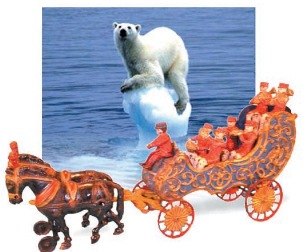Do experts really agree that we are causing a climate crisis?
Despite the past year of UN climate science scandals and vitally important research discoveries, we are still being told by activists, politicians, media and official science bodies that climate change science is ‘settled’. They tell us there is no doubt that our emissions of carbon dioxide (CO2) and other so-called ‘greenhouse gases’ are causing a climate crisis and we must take urgent action to prevent dangerous global warming. Supposedly, only a handful of unqualified naysayers contest this conclusion.
For example, in their film “Polar Science for Planet Earth”, the British Antarctic Survey (BAS) assert, “… Earth scientists are now beginning to understand … how to deal with unprecedented levels of man-made carbon dioxide and other greenhouse gases that control future climate change.” Newcastle University (U.K.) Professor Nicholas Owens, Director of both the BAS film and the BAS proper, asserts, “There is now overwhelming consensus that human activity is driving climate change,” a statement echoed verbatim in the film. Another BAS leader, Prof Corinne Le Quéré of the University of East Anglia maintains, “The only way to control climate change is through a drastic reduction in global CO2 emissions.”
Besides the absurdity of the notion that humanity, at this stage in our development, could hope to “control climate change” of planet Earth, observant readers will ask: how does anyone know that there is a consensus among climate scientists that our CO2 emissions are driving global climate, let alone that they are causing a crisis? After all, climate was changing for billions of years before we arrived on the scene. Are all the ancient natural climate drivers suddenly being eclipsed by human CO2 emissions? No one knows for sure, of course, but much recent research suggests it is highly improbable.
It is also true that no one knows, or even currently can know, what the so-called “consensus” is in the world climate science community about whether our CO2 emissions are causing a climate crisis. This is because there is not known to have been a conclusive worldwide poll about the topic among the thousands of scientists from the vast array of disciplines related to understanding the causes of global climate change.
Scientific theories are never proven by a show of hands anyways, no matter how scientifically esteemed those expressing their views are. If it were otherwise, the Earth would still be considered flat and space travel impossible. It is indeed those who go against the flow—independent, original thinkers—who are usually responsible for our most meaningful advances in science. But, most reporters, politicians and the public understand little of the scientific method and even less about the exceptionally complex field of climate change science. Consequently, they often look for an indication of ‘consensus’ when trying to decide which science should form the basis of important public policies decisions. Distasteful though this is to pure scientists, it is a reality we need to recognize and it is therefore important to try to decide whether a reliable determination of ‘consensus’ has been made about the causes of climate change.
First, it is important to realize that, of the prominent national and international science bodies that have issued official statements that are truly in support of the CO2/climate crisis hypothesis, none are known to have released results that show a majority of their members agreeing with the assertion. Since the Canadian Geophysical Union (CGU) seems to have at least tried with the pre-Copenhagen Climate Conference open letter to the Government of Canada they endorsed along with four other organizations, the Canadian Meteorological and Ocean Society (CMOS) included, it is worth examining the letter’s contents closely (while wondering what special knowledge two of the signing societies, the Canadian Society of Soil Science and the Canadian Society of Zoologists, would have about the causes of global climate change). The following discussion is an illustration of the problems inherent in many such efforts.
View entire study as PDF (23 Pages)

